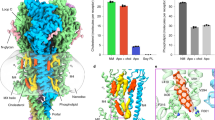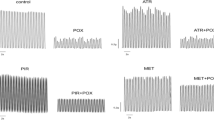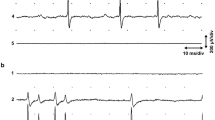Abstract
ACETYLCHOLINE added to Ringer solution in which m. rectus abdominis of the frog (Rana temporaria) is immersed causes the well-known acetylcholine contracture of the muscle. The magnitude of this shortening depends on the functional state of the muscle, the concentration of acetylcholine, the temperature of the bath, and on the constituents of the medium surrounding the muscle. Many agents which increase the acetylcholine activity or, when present alone, induce a shortening of the m. rectus, have been described. Some of these, according to their mode of action, can be used for sensitizing biological acetylcholine titration. In some cases this effect can be explained by the inhibition of cholinesterases present in the muscle. According to Torda1 and Hsi Chung Chang et al. 2 acetone is also included in this group.
This is a preview of subscription content, access via your institution
Access options
Subscribe to this journal
Receive 51 print issues and online access
$199.00 per year
only $3.90 per issue
Buy this article
- Purchase on Springer Link
- Instant access to full article PDF
Prices may be subject to local taxes which are calculated during checkout
Similar content being viewed by others
References
Torda, C., and Wolff, H. G., Amer. J. Physiol., 145, 419 (1945).
Hsi Chun Chang, Tsun Mi Lin, and Tsun Yun Lin, Proc. Exp. Biol. Med., 70, 129 (1949).
Author information
Authors and Affiliations
Rights and permissions
About this article
Cite this article
ZELENÝ, A., KOZÁK, J. Action of Acetone on the Tonic Muscle of the Frog. Nature 181, 1340–1341 (1958). https://doi.org/10.1038/1811340a0
Issue Date:
DOI: https://doi.org/10.1038/1811340a0
Comments
By submitting a comment you agree to abide by our Terms and Community Guidelines. If you find something abusive or that does not comply with our terms or guidelines please flag it as inappropriate.



